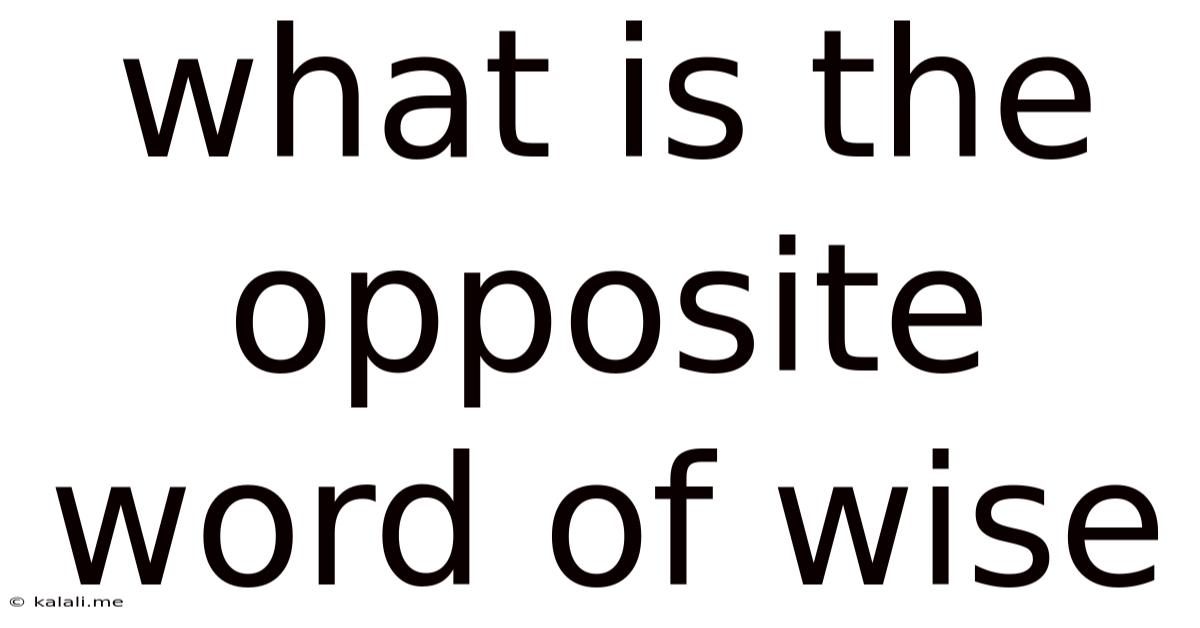What Is The Opposite Word Of Wise
Kalali
Jun 13, 2025 · 3 min read

Table of Contents
What is the Opposite of Wise? Exploring Antonyms and Contextual Nuances
Finding the perfect opposite of a word like "wise" isn't always straightforward. While there isn't one single, universally accepted antonym, several words capture different aspects of its opposite meaning. This article delves into the nuances of "wise" and explores its various antonyms, considering the context in which the word is used. Understanding these subtleties is crucial for effective communication and achieving precision in your writing.
The word "wise" encompasses several key ideas: possessing great knowledge and understanding, showing good judgment, and acting prudently. Therefore, its opposite might focus on lacking knowledge, poor judgment, or foolish behavior.
Antonyms Focusing on Lack of Knowledge and Understanding
-
Ignorant: This is a strong antonym, highlighting a complete lack of knowledge or awareness about a particular subject or in general. Someone ignorant might not even realize they lack the necessary understanding. For example, "He was wise to the dangers, unlike his ignorant friend."
-
Uninformed: This word suggests a lack of knowledge, but it's often less harsh than "ignorant." It implies a lack of information rather than a fundamental lack of understanding. A person can be uninformed about a specific topic without being generally ignorant. Consider, "Her decision was unwise because she was uninformed about the consequences."
Antonyms Emphasizing Poor Judgment and Foolish Behavior
-
Foolish: This is a common and versatile antonym, directly contrasting the wisdom of sound judgment. A foolish person acts without thinking through the consequences. "His wise counsel was ignored by his foolish son."
-
Unwise: This is a direct and simple antonym, highlighting the lack of wisdom in a decision or action. It's a straightforward way to indicate the opposite of a wise choice. "That was an unwise investment."
-
Silly: This antonym is less severe than "foolish," suggesting a lack of seriousness or good sense, often in a playful or lighthearted way. "Her wise advice was countered by her silly remark."
-
Rash: This implies acting hastily and without careful consideration. It focuses on the impulsive nature of unwise actions. "His rash decision led to unfortunate consequences, unlike the wise approach of his colleague."
-
Reckless: Similar to rash, but implies a disregard for consequences and potential danger. It suggests a more serious lack of judgment than rashness alone. "Her reckless actions contrasted sharply with her mother's wise guidance."
Context is Key: Choosing the Right Antonym
The best antonym for "wise" depends heavily on the specific context. Consider what aspect of "wisdom" you want to contrast. Are you emphasizing the lack of knowledge, the poor judgment, or the foolish behavior? Choosing the right antonym ensures clarity and precision in your writing. For instance:
- "Wise old owl" would have an antonym that focuses on lack of knowledge or experience, perhaps "silly young fledgling."
- "A wise investment" would contrast well with "an unwise gamble" or "a reckless expenditure."
- "Wise words of advice" could be opposed by "foolish pronouncements" or "rash suggestions."
By carefully considering the context and selecting the most appropriate antonym, you can effectively communicate the opposite of "wise" and enhance the precision and impact of your writing.
Latest Posts
Latest Posts
-
How Many Cups Are In 3 Quarts
Jul 01, 2025
-
Four Letter Word With Second Letter A
Jul 01, 2025
-
How Many 1 8 Cups Are In 2 3 Cup
Jul 01, 2025
-
How Many Slices Of Turkey In 2 Oz
Jul 01, 2025
-
Omnipoint Miami E License Llc Miami Fl
Jul 01, 2025
Related Post
Thank you for visiting our website which covers about What Is The Opposite Word Of Wise . We hope the information provided has been useful to you. Feel free to contact us if you have any questions or need further assistance. See you next time and don't miss to bookmark.